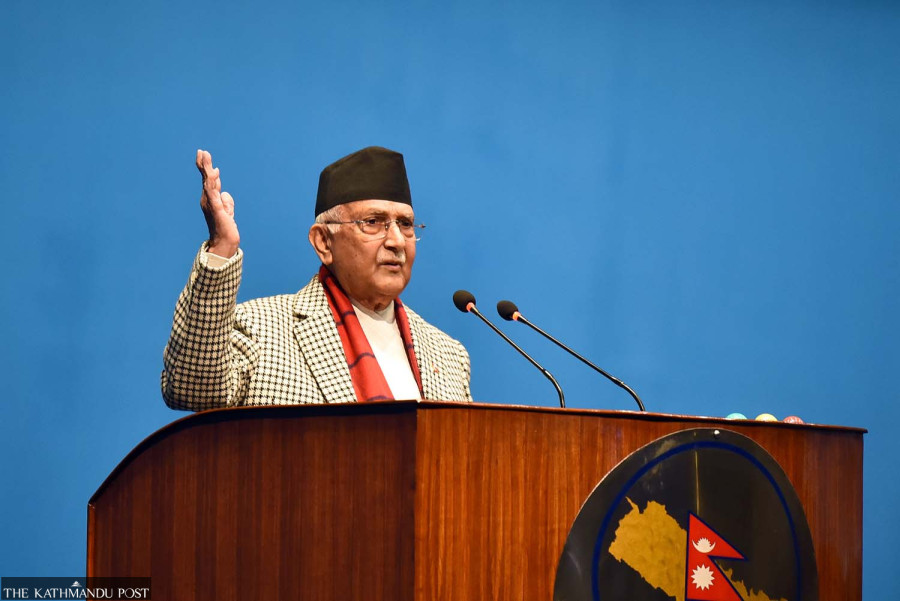National
No government should put country in a debt trap: Oli
Speaking in Parliament, prime minister says Nepal lacks the luxury to choose between MCC or BRI and stresses careful selection of foreign assistance.
Post Report
As Nepal debates its foreign aid strategy, Prime Minister KP Sharma Oli has said that no government, regardless of who leads it, should take indiscriminate loans that push the country into debt trap and burden future generations.
Addressing the first meeting of the winter session of House of Representatives on Friday, the prime minister said that in the name of staying clean, Nepal cannot remain underdeveloped, and in the name of taking bold steps, it cannot take loans indiscriminately and put country in a debt trap and impose a burden on future generations.
Not just Nepal, but no country should do that, the prime minister added.
“There was a time when a finance minister was considered successful for securing huge loans. But times have changed. If any aid does not align with our national interest, or if we do not have the capacity to repay a loan, we have to be careful before accepting such loans,” said the prime minister.
A national debate has begun over the rationale behind accepting the foreign aid, loans, and grants, particularly after the government in 2017 signed onto the Belt and Road Initiative with China and Millennium Challenge Corporation Compact with the US. Both agreements have sparked controversies and discussions at various levels.
The MCC has already come into the force, with Nepal contributing $197 million alongside $550 million in US funding over the next four years for two projects. But progress on BRI has been minimal. During Prime Minister Oli’s recent visit to China, both sides reached a comprehensive agreement under which at least ten projects will be developed under the BRI framework, although investment and financing modalities have yet to be decided.
Explaining his government’s stance on international relations and foreign policy, Prime Minister Oli said, “We are serious about our relations with both neighbors, and want to maintain mutually beneficial relations, leveraging their development for our own growth.”
“On international relations, we are in favour of mutual cooperation, world peace and prosperity and committed towards justifiable national interest,” said the prime minister reflecting on his participation in the 79th session of the United Nations General Assembly in September last year, and his meetings with world leaders on the sidelines.
The prime minister also informed the House about the government's plan to host Sagarmatha Sambad, a multi-stakeholder forum aimed at deliberating on important global, regional and national issues on the theme of climate change and mountain economy on May 16-18.
Oli described his December visit to China as highly successful, pointing to the long-anticipated framework cooperation on BRI, and other agreements and understandings.
During the visit, China pledged $20 million to Nepal that China had committed to provide to Nepal since 2015, and Chinese President Xi Jinping announced an additional Rs9.34 billion aid.
“We issued a joint statement incorporating the agreements reached during the visit. In the statement, it is incorporated that both sides have reviewed the past agreements, understandings and decisions and directed to take Nepal—China relations to a new height in the future,” said the prime minister adding that during the time of the visit, a wrong narrative and unnecessary debate was supposed to establish against the BRI. In this context, I want to make a comment here, said the prime minister, we are suppressed by the resources when it comes to infrastructure and overall development.
“Whether it’s the BRI, the MCC, the World Bank, or the Asian Infrastructure and Investment Bank, we don’t have the luxury to choose our sources of assistance,” said Oli. “We are in no position to pick and choose. Whether it’s grants, concessional loans, foreign direct investment, or blended finance, we have no alternative but to accept support that benefits the nation and the people,” the prime minister said.




 11.12°C Kathmandu
11.12°C Kathmandu












